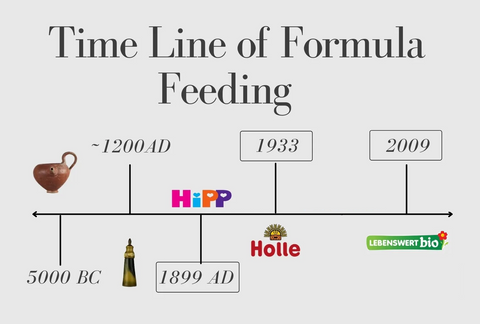The Invention of Baby Formula
Baby formula feels like it’s been around forever, but it dates back to 5,000 BC! So how did moms get along before formula? And how did we get where we are now with the wide variety of options? Let’s get into it!
Before Formula
Many moms cannot breastfeed, depend on supplementing, or breastfeed doesn’t fit their needs. In Greece, around 950 BC, breastfeeding for the elite introduced wet nurses, where other women would breastfeed their children. Throughout the many years, infants received breast milk through other women, and by the early 17th century, a French obstetrician objected that babies need to be fed by their biological mothers.
While animal milk and wet nursing were most popular for many years, around the 1930s, advancements were made to alternative formulas.

Formula Regulations
In 1929 the American Medical Association (AMA) formed the Committee on Foods to approve the safety and quality of formula composition. Infant food companies had to seek AMA approval and receive the “Seal of Acceptance.”
Partnerships solidified between physicians and formula companies, ramping up the trust and use of formula.
Introduction of European Formula

Since the beginning European formulas have been rated highly. They have been the world's most eco-friendly and organic option, focused on natural nutrition.
HiPP
HiPP was founded in 1899 by Joseph Hipp. He was called to help his own children with their nutritional needs, and therefore pioneered today’s largest range of European baby formulas. HiPP is made with natural ingredients using organic farming.
Holle
Holle entered the scene in 1933. After its introduction, it put out Holle whole meal bread and Holle organic baby food first, making Holle one of Europe's first organic baby food manufacturers!
Today Holle has a complete line of infant and toddler formulas using grass-fed organic cow’s and goat’s milk.
Lebenswert
Important to know is that Lebenswert is part of the Holle Family. It was introduced about ten years ago to give parents a cheaper alternative to organic and high-quality baby formula. Holle is an established and respected manufacturer with almost 90 years of experience in the baby food industry. Their Lebenswert brand is also held to high standards, making their products widely regarded as some of the best formulas.
Lebenswert formula was designed to offer parents a more budget-friendly organic formula. That being said, Lebenswert makes no compromises when providing your little one with a formula made according to high European organic standards with premium ingredients.
The Bioland certification of all Lebenswert ingredients means that the formula is derived from farms that abide by high standards of farming practices.
Mastering Baby Formula

It’s been a long road, but baby formula has been mastered by experts who primarily focus on nutrition for your little one. Check out the wide selection,of European Organic Formulas with free ,fast delivery on all orders!
Recap
There is an extensive history behind baby formula. European manufacturers like Hipp, Holle ,and Lebenswert have come a long way to ensure your growing baby gets all the nourishment they need as they progress from infant to toddler. You can feel good feeding your newborn formula, knowing that the science behind it is constantly being updated and regulations are continuously being implemented to ensure the health of growing babies worldwide.
Please note: Breastfeeding is the best nutrition for your baby, because breast milk provides your child with all the essential nutrients they need for growth and development. Please consult your pediatrician if your child requires supplemental feeding.
